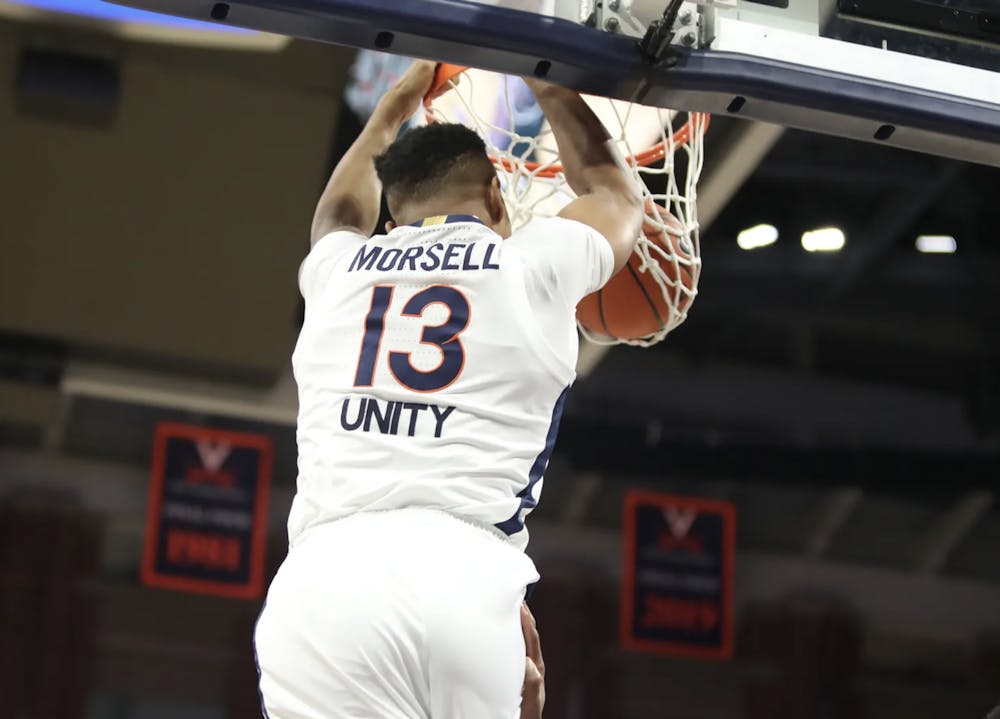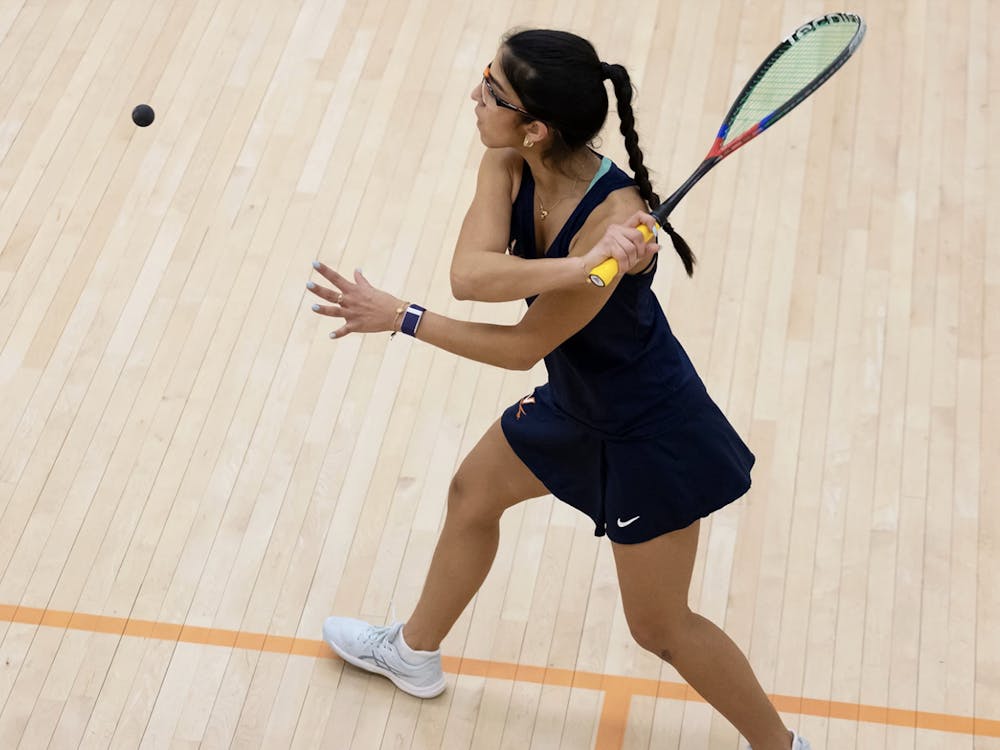As soon as the Ohio Bobcats finished polishing the dagger driven into the hearts of the Cavalier faithful in a not-so-unpredictable 62-58 victory, the realization became abundantly clear — Virginia would no longer hold onto its title as defending national champions. In the wake of a coronavirus-shortened 2020 season, Virginia basketball had been sitting on its perch atop the college basketball world for nearly two years after a historic run to the national championship in 2019.
This would be an easy defeat to write off. The Cavaliers were coming off a COVID-19 scare that ended their ACC Tournament run and threatened their March Madness eligibility. After finally clearing COVID-19 protocols, Virginia limped into Indianapolis the day before its game. The Cavaliers hadn’t practiced on a basketball court in over a week, and many pundits predicted an early exit on the basis of their extenuating circumstances rather than their play. You could take all of this into account, look at the four-point differential in the final score and conclude that Virginia succeeded by even keeping the game close in the face of an unprecedented situation. The Cavaliers had to overcome tremendous adversity to even step foot on the court against Ohio, and the team is certainly deserving of praise.
Unfortunately, blaming the pandemic doesn’t tell the full tale of the tape. Virginia fell into the same traps it saw all season. The game featured a textbook Cavalier offense, where the team would score in spurts and then fall into an offensive lull. During one stretch, Virginia put up a measly two points in 10 minutes, allowing the Bobcats to snatch the lead. The Cavaliers were also extremely inconsistent from three-point range. Graduate transfer guard Sam Hauser and junior guard Trey Murphy simply couldn’t hit shots from the arc at a high percentage, and just like all season, no one on the team could step up and fill in for either sharpshooter while they were cold.
The game might not have felt like it by the end, but Virginia kept it close. With ample time to practice beforehand, they might have beaten Ohio. However, if Virginia’s persistent offensive struggles are any indication, this was not a team destined to repeat a national title.
Still, the future looked bright going into the offseason. Losing redshirt senior forward Jay Huff and Hauser certainly hurt, but the team had a lot of young talent to build with.
Unfortunately, much of that young talent immediately entered the transfer portal.
The first piece to fall was sophomore guard Casey Morsell. Inconsistency plagued Morsell over the course of his career at Virginia. His defensive play was solid, but he never developed into the shooter the Cavaliers needed. Some so-called pundits had even predicted that this past season would be his breakout year. Morsell did make strides in improving his offensive efficiency — from shooting 27.7 percent from the field in his freshman year to 39.6 percent this year — but he never received enough minutes to make a consistent impact. In fact, his minutes per game over his two college seasons fell from 21.8 to 15.0. Coach Tony Bennett’s decision not to prioritize Morsell’s development is a perplexing one, given his status as the ninth-highest-rated recruit Virginia has ever landed. Now, Morsell will look for a fresh start with NC State.
The next Cavalier to enter the transfer portal was sophomore forward Justin McKoy. McKoy was not the highly touted recruit Morsell was, but he had all the tools necessary to blossom into a starting-caliber player. Like Morsell, McKoy improved his offensive efficiency in his sophomore season, shooting a respectable 48.3 percent from the field this year. Unlike Morsell, this also came with an increase in minutes. McKoy seized upon this opportunity, building on nearly every statistical category from his freshman year. Most notably, his defensive rebounds per game shot up from a measly 0.7 to 2.4 this season. McKoy was quietly developing into an intimidating presence on the court, and losing him to ACC rival North Carolina certainly hurts.
However, the one true blow Virginia received this offseason was the loss of freshman guard Jabri-Abdur Rahim. Abdur-Rahim’s commitment to Virginia in 2019 made waves. He was the 38th-highest-rated recruit in his class and the second-highest Virginia has ever landed. Fans hoped Abdur-Rahim would carry the torch of Kyle Guy, De’Andre Hunter and Ty Jerome and usher in a new era of Virginia basketball. Abdur-Rahim played a combined 37 minutes in his career with the Cavaliers. Now, he’ll depart Charlottesville and join Coach Tom Crean and the Georgia Bulldogs.
Abdur Rahim’s lack of play is quite simply a blunder on Bennett’s part. You could make the excuse that few Virginia freshmen ever earn significant minutes, except for the fact that fellow freshman guard Reece Beekman was one of the most consistent faces on the court. Maybe Bennett saw something in practice, or perhaps he thought Beekman’s skill set was more refined. Either way, given the lack of a consistent rotation throughout the season, you would think Bennett would at least give Abdur-Rahim a prove-it chance.
Beekman did propel himself to star status after sinking a buzzer-beater against Syracuse in the ACC Tournament quarterfinals, but he never truly locked down his starting spot. While his defensive play was relatively solid all season, Beekman only averaged 4.7 points per game over nearly 30 minutes played per game. Plagued by offensive inconsistency all season, Bennett’s decision not to unleash one of the most highly touted scorers in his recruiting class is mind-boggling. Abdur-Rahim’s play didn’t exactly justify more time, but 37 minutes is simply not an adequate sample size to evaluate a player.
Now, two Virginia guards and three Cavaliers overall will don different jerseys in the coming winter. To make matters worse, Murphy has declared for the NBA draft. However, in the event he goes undrafted, he maintains his eligibility and can still play basketball in Charlottesville next season.
Even with the uncharacteristic mass exodus of players, the Cavaliers will likely remain a competitive team. Junior transfer forward Jayden Gardner from East Carolina and sophomore transfer guard Armaan Franklin from Indiana will immediately add an offensive jolt to a Virginia team that desperately needs it. Particularly, the addition of Gardner, an all-AAC player and the second leading scorer in the conference, is a huge win for Virginia.
Still, the revolving door of transfers this offseason has broader implications for the program.
Virginia’s recruiting class for 2021 is already weaker than previous years — with Taine Murray, a four-star guard from New Zealand, standing as the only recruit of note. The addition of Murray is exciting, but the 2021 recruiting class has not panned out the way Virginia hoped. Currently, the Cavalier class is ranked 12th out of the 15 ACC teams. The past two seasons, the Virginia recruiting class never ranked below five. Bennett still has time to recruit more players, but the recent departures significantly hurt his case.
What kind of a message does it send when the two highest-ranked recruits Virginia has landed in the past two years have already transferred out?
Certainly, prized recruits with Virginia offers are closely considering this. Any top-50 high school players Bennett extends an offer to in the future will be a little more wary of the program with Abdur-Rahim’s transfer after a single season. In an era where the bar for talent is so high and the competition to recruit high school players is fiercer than ever, questions over a program’s culture weigh heavily.
Bennett must keep these questions in mind when crafting a rotation next season to prevent a repeat of this offseason.
Gardner and Franklin will surely play essential roles going forward — just look at how well Hauser and Murphy acclimated to the team. Virginia should certainly look to add more transfers in the future, but the team needs to ensure that this isn’t at the expense of the development of young players. After all, much of the 2019 championship-winning roster was built from the ground up. Guy, Jerome and Hunter were all brought in as high school recruits and developed into professional-level talent through the Bennett system.
Let’s hope the departures of Morsell, Abdur-Rahim and McKoy prove to be an isolated incident. A revolving door is a dangerous precedent to set for the culture of the team, and Bennett should look to pull it out by the hinges after this offseason.







